Key takeaways:
- Ocean conservation is essential for both marine ecosystems and human survival, as oceans provide a significant portion of the oxygen we breathe.
- Local cleanups protect marine life, promote community engagement, and foster a sense of collective responsibility toward ocean health.
- Effective partnerships in cleanups enhance community involvement, educational opportunities, and the potential for broader impact through collaboration.
- Adapting strategies during challenges, such as weather issues, can lead to innovation and maintain momentum in conservation efforts.
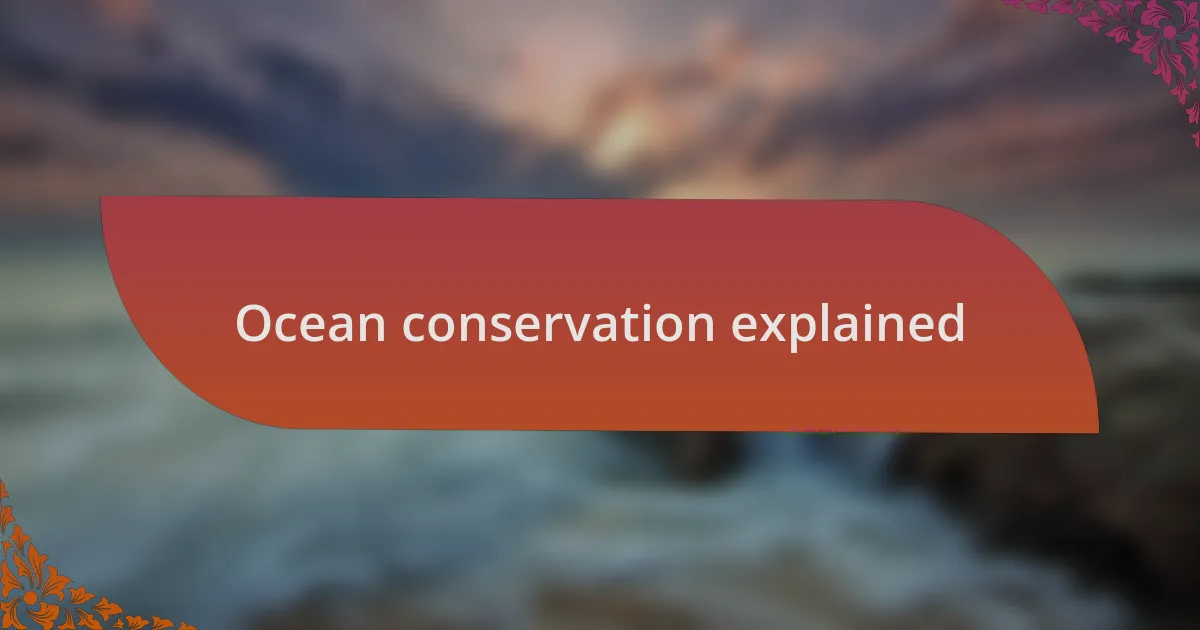
Ocean conservation explained
Ocean conservation is about protecting the vast ecosystems of our seas, which play a crucial role in regulating climate and supporting biodiversity. Reflecting on my own experiences, I remember the awe I felt during my first dive in a coral reef. It was breathtaking, yet I couldn’t shake the anxiety of knowing that these beautiful environments are under threat from pollution and climate change.
Understanding ocean conservation requires us to recognize its importance not just for marine life, but for our own survival as well. Have you ever thought about how much of the oxygen we breathe originates from the ocean? It’s staggering to realize that tiny phytoplankton produce about half of the Earth’s oxygen. This connection reinforces the reality that our well-being is intertwined with the health of our oceans.
As I participated in beach cleanups, I often encountered plastic debris, a pervasive threat that harms marine creatures and disturbs entire ecosystems. Each piece of trash I picked up felt like a small victory against a much larger battle. This hands-on engagement deepened my understanding of the urgent need for ocean conservation, an emotional reminder that every action, no matter how small, can contribute to a greater cause.
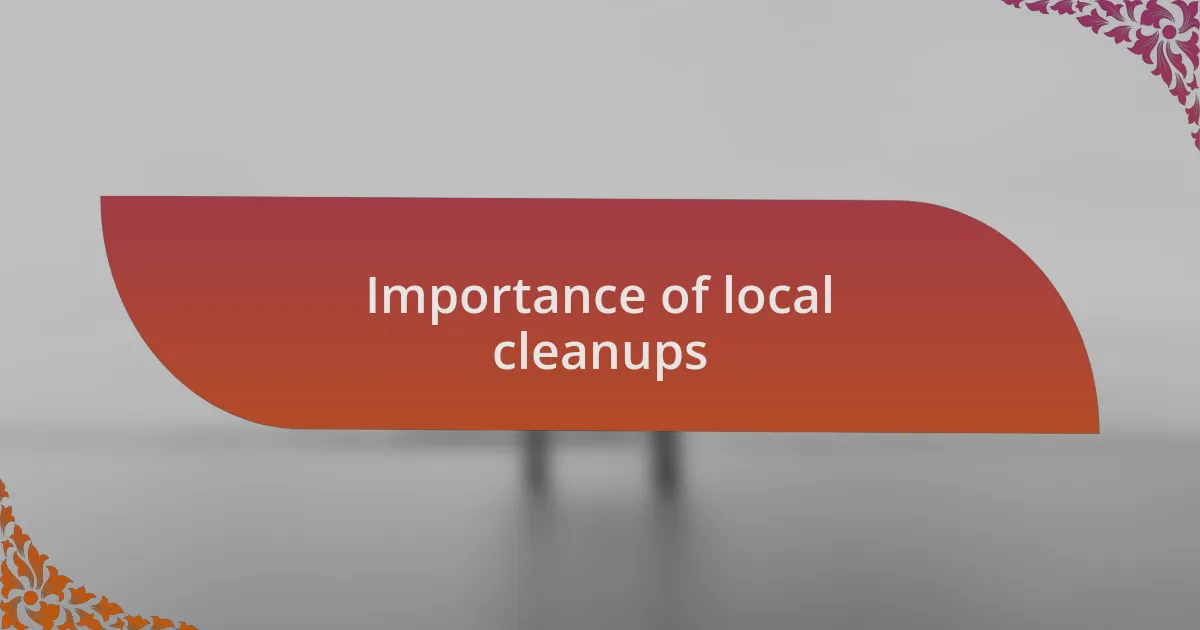
Importance of local cleanups
Local cleanups play a vital role in ocean conservation, acting as a direct line of defense against marine pollution. When I joined a cleanup group last summer, I was surprised to see how much litter accumulated in just a few hours. It’s alarming to think that the debris we collected could have easily ended up harming sea life if left untouched.
Moreover, these cleanups foster community awareness and engagement. I recall chatting with a local fisherman during one event who shared stories about how plastic affects his livelihood. This personal connection highlighted how local actions can ripple outward, creating awareness and inspiring others to care for our oceans.
Participating in multiple cleanups has reinforced my belief that every piece of trash we remove not only improves the immediate environment but also inspires change. Have you ever felt that rush of purpose when you see a bag filled with trash that could have harmed wildlife? It’s a reminder of the collective responsibility we have to protect our oceans. Each cleanup is a step toward a healthier ocean, and I find that incredibly empowering.
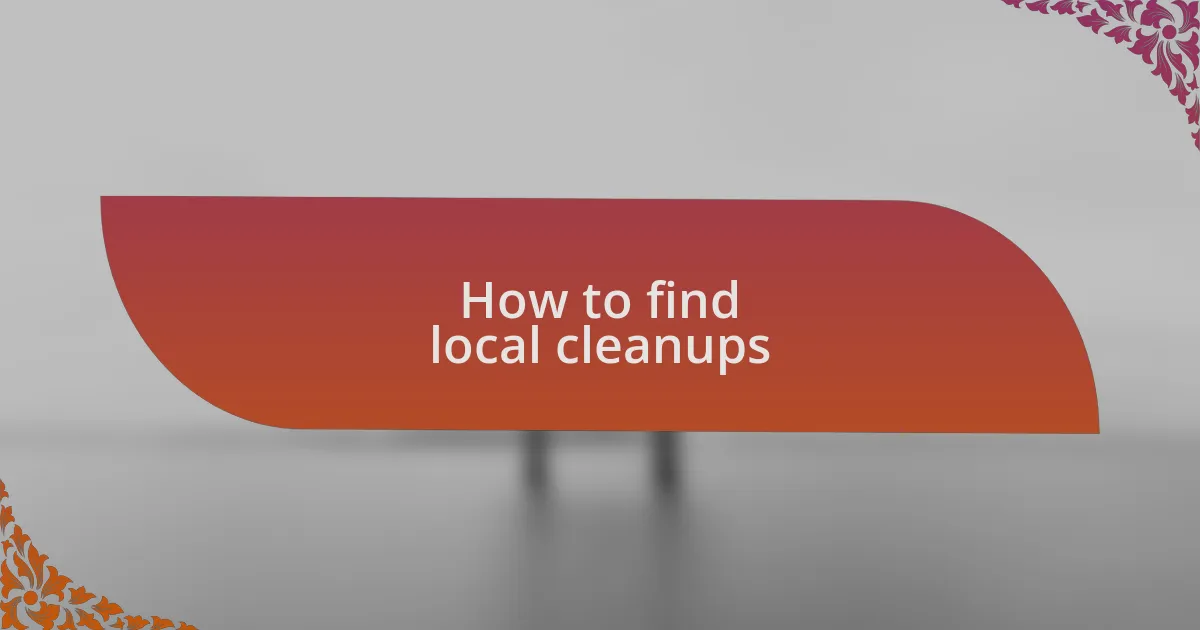
How to find local cleanups
Finding local cleanups can be simpler than you think. I often start by checking community bulletin boards or local social media groups. Just last month, I stumbled upon an event through a Facebook group that was dedicated to ocean lovers in my area—what a great way to connect with people who share similar passions!
Word of mouth also works wonders, so don’t hesitate to ask friends, family, or even coworkers if they know of any upcoming cleanups. One weekend, I mentioned my interest in cleanups to a neighbor, and they informed me of a biannual beach clean, which had been going strong for years. You never know who might be in the loop!
In addition to local resources, websites like Meetup or EarthDay.org often list organized cleanups by region. I remember scrolling through one such site and finding an event that perfectly aligned with my schedule and goals. It was refreshing to see that so many people were eager to take part in making a difference. Have you considered exploring these platforms? They can open up a world of opportunities to engage in local environmental efforts.
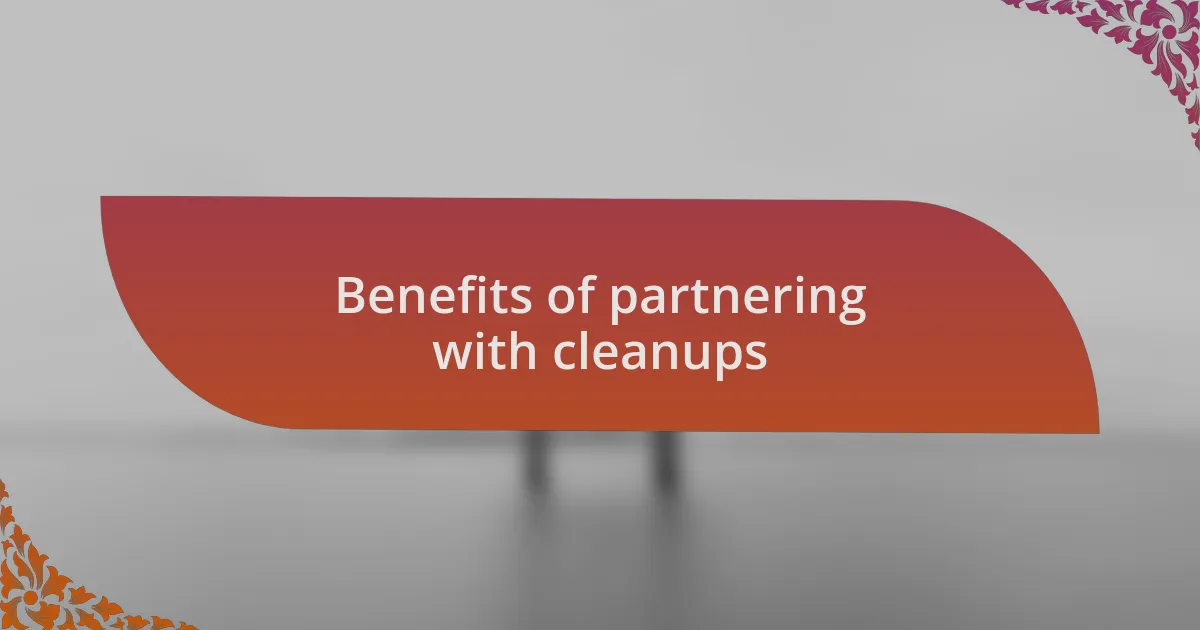
Benefits of partnering with cleanups
Partnering with local cleanups offers a tangible way to see the direct impact of your efforts. I remember the first time I helped organize a cleanup—after just a few hours, we had filled dozens of bags with litter. Witnessing the community come together for a common cause was incredibly heartwarming. It made me feel connected not just to the ocean, but to the people who care about it just as much.
Collaboration with cleanups can also enhance your network. Over the years, I’ve met passionate individuals and local organizations dedicated to conservation. One afternoon spent at a beach cleanup led to ongoing collaborations with marine biologists who offered insights into the importance of plastic reduction. Have you considered how your passion might align with others?
Moreover, these partnerships often bring educational opportunities. During one event, a local expert shared the effects of pollution on marine life, leaving me with a deeper understanding and renewed commitment to advocacy. The emotional weight of learning how our actions affect the ocean can be powerful. How can our collective efforts foster a healthier ecosystem for generations to come?
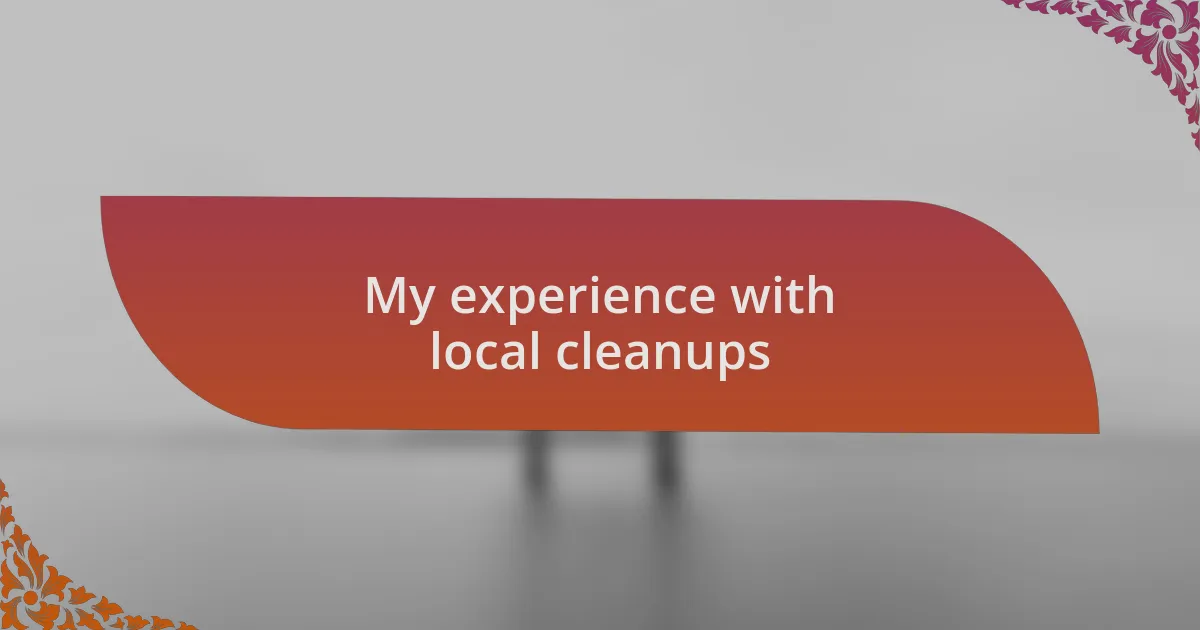
My experience with local cleanups
Participating in local cleanups has been a transformative experience for me. I vividly recall one day when we tackled a particularly polluted stretch of shoreline. As I picked up plastic and other debris, I couldn’t help but feel a mix of frustration and determination. It made me realize just how much our actions—and inactions—impact our oceans.
I’ve encountered some unforgettable moments during these events. One afternoon, an elderly lady shared her stories of fishing in the area as a child, describing how the waters used to teem with life. Listening to her, I became acutely aware of the urgent need to restore that lost vibrancy. How many more stories like hers are out there, waiting to be preserved through our collective actions?
In another instance, after a cleanup, we gathered around for a debrief and I was struck by how everyone had different insights. A high school student spoke about the correlation between the plastics we collected and threats to marine wildlife. It ignited a passionate discussion, reminding me how crucial it is to keep educating ourselves and each other. Isn’t it amazing how a small act of cleaning can spark such meaningful conversations?
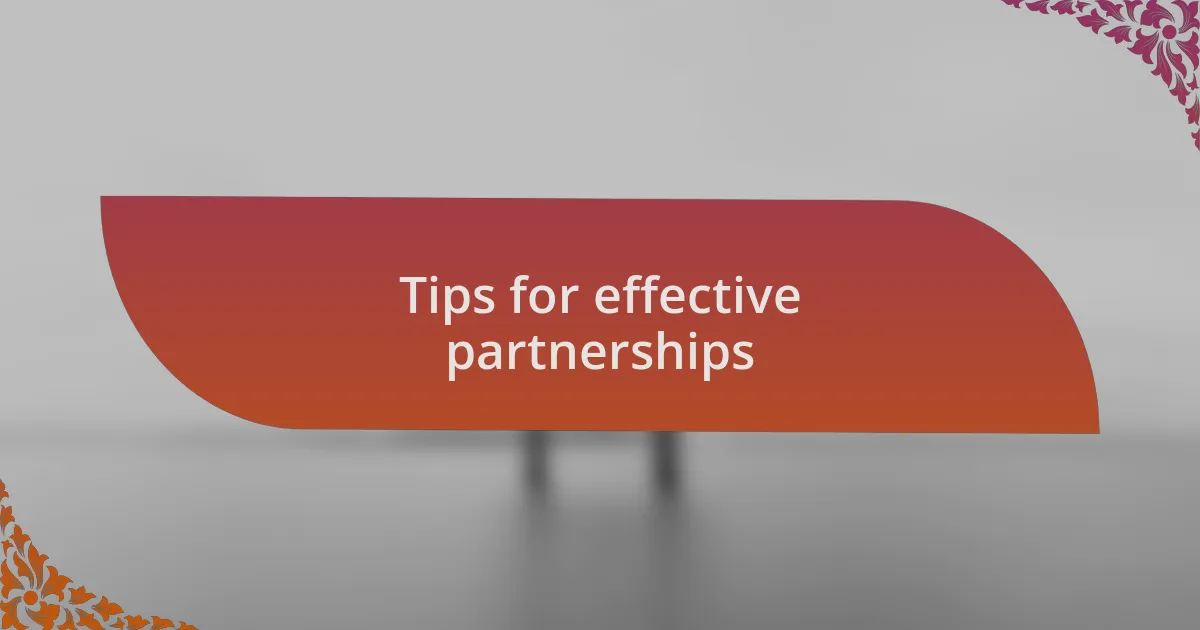
Tips for effective partnerships
When partnering with local cleanup groups, it’s vital to establish clear communication from the start. In my experience, I once collaborated with a community organization where I learned the importance of setting mutual goals. With everyone on the same page regarding our expectations, we not only worked efficiently but also fostered a sense of camaraderie that made the effort more rewarding.
Building relationships with local businesses can also enhance the outreach of your initiative. I remember collaborating with a local café that provided discounts to volunteers, which not only encouraged participation but also created a buzz around our cause. Isn’t it wonderful how community members can rally together to support a shared goal? Engaging local businesses not only broadens your network but reinforces a sense of shared responsibility for our oceans.
Flexibility in your approach can lead to deeper connection and innovation. I once faced challenges with weather conditions during a scheduled cleanup, and rather than cancel the event, we adapted by shifting to an online awareness campaign. This experience opened my eyes to the potential of alternative strategies when faced with obstacles. How often do we let unforeseen circumstances derail our efforts? Embracing adaptability can transform challenges into opportunities.